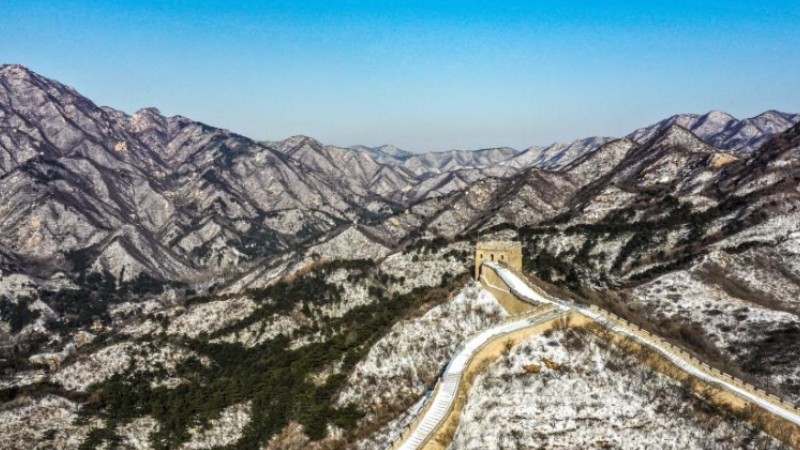Xi Story: Cradle of China's rural reform embarks on rural revitalization journey
HEFEI, Dec. 20 (Xinhua) -- Xiaogang, a village where China's rural reform began 45 years ago, is making strides on its new journey towards rural revitalization through deepened reform.
In 1978, 18 farmers in the poverty-stricken village in east China's Anhui Province took tremendous risks in secretly signing an agreement to contract collective land to individual households.
The household contract responsibility system that derived from Xiaogang's experiment was spread nationwide in a few years and fueled farmers' enthusiasm for agricultural production.
In April 2016, President Xi Jinping presided over a symposium on rural reform in Xiaogang, now described as "the cradle of China's rural reform."
Xi, also general secretary of the Communist Party of China (CPC) Central Committee and chairman of the Central Military Commission, likened the critical rural reform in Xiaogang to a "life and death" moment.
Thanks to an array of reform moves advanced by Xi, Xiaogang has developed a fast-growing modern agriculture and several other new industries, making steady progress towards the goals Xi had envisaged for the countryside.
STRONG AGRICULTURE
To address rural conundrums and problems today, deepened reform is needed, Xi said in the Xiaogang symposium. To deepen rural reform under new circumstances, we must continue to focus on properly handling the relationship between farmers and land, Xi said.
Xi has pushed for significant reforms on the rights to contracted rural land and the rural collective property rights system, noting that "reform must be well leveraged as a powerful instrument for advancing rural revitalization across the board."
China has allowed farmers to retain contract rights over their allotted farmland while transferring management rights if they lease the land to others.
The reform, together with the extension of the rural land contract by a further 30 years, has provided further assurance to farmers and helped accelerate farmland transfer and large-scale farming.
Cheng Xibing from Xiaogang Village benefited from the reform. He started large-scale and mechanized farming in 2014 and his plantation has expanded year by year to around 50 hectares this year.
Since 2018, Xiaogang has developed about 870 hectares of high-quality farmland by amalgamating small plots of land, 70 percent of which has been transferred for large-scale farming, said Li Jinzhu, first secretary of the village Party committee.
The village has encouraged diversified entities and attracted leading agricultural groups like the Beidahuang Group and the Anhui Agricultural Reclamation Group. The local agricultural mechanization rate has reached over 97 percent.
"Many of us did not expect this to happen five years ago. Now we have factory seedlings, machine transplanting, and drone pesticide spraying," Li said.
While addressing the annual central rural work conference in 2022, Xi stressed the need to rely on science and technology as well as reform to speed up the building of a strong agriculture.
A country must first strengthen agriculture to make itself strong, and only when agriculture is strong can the country be strong, he noted.
BULGING POCKETS
The country should foster and develop new industries and new forms of business in rural areas and broaden channels for farmers to increase their incomes and get rich, Xi has said.
Under the guidance of Xi's thought, villages like Xiaogang are embracing new dynamism of development.
Xiaogang has built an agro-processing industrial park, with 11 enterprises providing people in the village and nearby villages with over 2,000 jobs at their doorstep. It is also actively developing tourism, offering rural leisure, study tours, and training and conference services.
The tourism boom has brought more diners and revenue to a restaurant operated by the family of Yan Jinchang, one of the 18 farmers who signed the secret agreement on land contracting in 1978.
"Land transfer has not reduced our income but has freed up the labor. Many can do other businesses or work in the cities, which is a win-win situation," said Yan, 80.
"We no longer have to worry about food and clothing. Residents now live in uniformly designed and neatly renovated or built two-story houses. Many already have private cars."
Xiaogang was among the first group of villages nationwide to pilot the reform of the rural collective property rights system. Its collective income increased from 8.2 million yuan (about 1.2 million U.S. dollars) in 2017 to 13 million yuan in 2022, with villagers receiving dividends for six consecutive years. During the period, the villagers' per capita disposable income increased from 18,000 yuan to 33,000 yuan.
Through dividends, payments made to the villagers included medical and social security funds, and cash rewards for college students, and the village has also handed out 30 million yuan to more than 4,000 villagers over six years.
"This is just the beginning. We are getting people to join in our initiatives to achieve common prosperity," said Li, the village's first Party secretary.
At last week's central economic work conference, it was pointed out that it will be imperative to advance rural revitalization in all respects in an effective manner, and measures should be intensified to increase rural residents' incomes, and strengths should be pooled to do things from which residents can get immediate benefits, so as to build a beautiful and harmonious countryside that is desirable to live and work in.
"We will strive to build a robust village with a beautiful environment, thriving industry, and rich villagers," said Li.
Photos
Related Stories
- Profile: Xi Jinping steers decade of reform toward Chinese modernization
- Xi stresses consolidating agricultural foundation, advancing rural revitalization
- Xi's important speech infuses Hong Kong's development with strong confidence
- Xi says China ready to work with Nicaragua against hegemonism, power politics
- Xi says China to keep supporting Nicaragua in safeguarding national independence, dignity
Copyright © 2023 People's Daily Online. All Rights Reserved.









